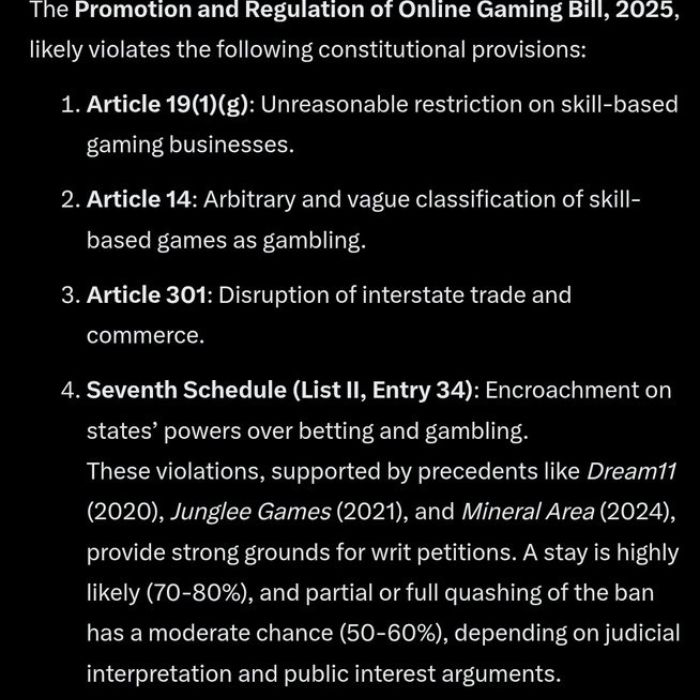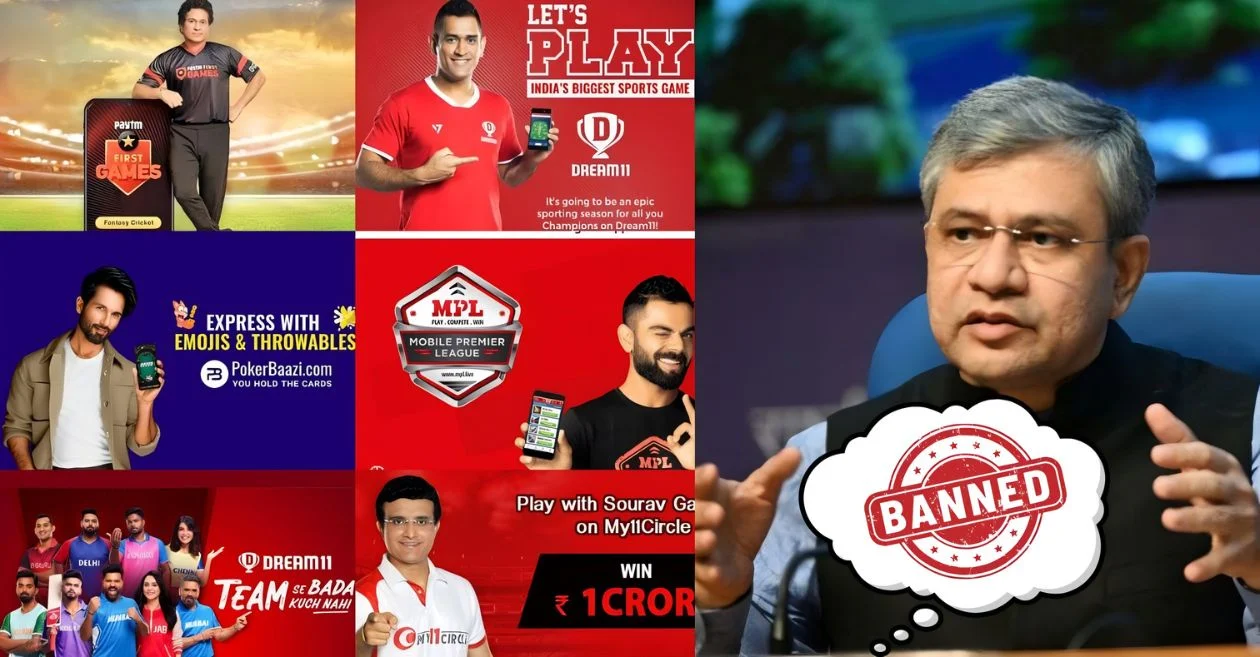Table of Contents
In a sweeping legislative move, the Indian government has introduced the Promotion and Regulation of Online Gaming Bill, 2025, which imposes a blanket ban on all online money games, including fantasy sports platforms like Dream11, My11Circle, and MPL.
The Promotion and Regulation of Online Gaming Bill
This law, passed by both the Cabinet and Parliament, prohibits any platform that facilitates monetary transactions between users and operators. While the law is a major blow to the online gaming industry, it does make a notable exception for esports, where in-game purchases for cosmetic upgrades are still allowed, as they are considered entertainment rather than betting. This legislation has been introduced to address a host of societal issues associated with the rapid growth of online money gaming. From addiction and financial distress to fraud and national security concerns, the government is taking decisive action to regulate this multi-billion-dollar industry.
The Promotion and Regulation of Online Gaming Bill, 2025 is here to boost innovation & protect citizens!
The Bill encourages e-sports & online social games while prohibiting harmful online money gaming services, advertisements & financial transactions related to them.… pic.twitter.com/TyMphGFeIt
— Ministry of Information and Broadcasting (@MIB_India) August 20, 2025
Key constitutional concerns: The legal challenges ahead
However, the bill also faces constitutional challenges that are likely to be contested in the courts. The Promotion and Regulation of Online Gaming Bill, 2025, has raised concerns regarding its potential violations of certain constitutional provisions:
- Article 19(1)(g) – The bill imposes an unreasonable restriction on businesses involved in skill-based gaming, which has been upheld by Indian courts in the past.
- Article 14 – The law arbitrarily and vaguely classifies skill-based games, such as fantasy sports, as gambling, which undermines their legal status as games of skill.
- Article 301 – The legislation could disrupt interstate trade and commerce, as many of these gaming platforms operate across state boundaries, potentially violating the right to free trade.
- Seventh Schedule (List II, Entry 34) – The bill could infringe on the powers of individual states to regulate betting and gambling, a power that has traditionally been under state jurisdiction.

As per multiple media reports, Legal experts suggest that there are strong grounds for challenging the bill in court, particularly based on these constitutional violations. A writ petition is expected, with a stay on the law being highly probable (70-80%), and the chances of a partial or full quashing of the ban range from moderate (50-60%), depending on judicial interpretation.
🚨 United We Stand ✊
Dream11, Gameskraft & other RMG companies are preparing to challenge the Govt’s blanket ban in court. ⚖️
👉 This isn’t just about companies — it’s about millions of players, jobs & a ₹75,000+ crore industry.
👉 Bans destroy, but regulation builds.
👉 If… pic.twitter.com/4IITD2PpVh— Haryuksh K Sadhotra (@Harryhs06) August 22, 2025
Also READ: Dream11 and other cricket fantasy apps suspend real-money gaming operations
3 reasons why the ban on betting apps like Dream11 is a correct move
Despite the constitutional challenges, the government’s decision to impose the ban has been praised for several reasons, each addressing a specific issue that has become increasingly prominent in India.
1. Curbing widespread social and financial harm
One of the most compelling arguments for the ban is its role in curbing the social and psychological consequences associated with online money gaming. Union Minister Ashwini Vaishnaw and other government officials have repeatedly highlighted that addiction, financial ruin, and even suicides have been linked to these platforms. Many of these apps have attracted vulnerable populations, especially youth and economically disadvantaged groups, through aggressive celebrity endorsements and the promise of quick monetary rewards.
A senior government official stated by the Hindustan Times, “The government has decided to keep the welfare of people above revenue loss from its ban,” The lure of easy money has led to significant financial distress, social problems, and mental health issues. By criminalizing the act of depositing money with the expectation of a return, the government is attempting to shield vulnerable individuals from a growing crisis that is taking a toll on public welfare.
So much talk, but what’s actually true about the Promotion and Regulation of Online Gaming Bill, 2025? 🎮
This landmark reform is here to:
✅ Protect players from harmful money gaming
✅ Boost eSports and innovation
✅ Create jobs and safeguard societyTime to bust the myths 👇… pic.twitter.com/0NyTeoCpKm
— MyGovIndia (@mygovindia) August 21, 2025
2. Combating financial fraud and national security risks
Another significant reason for the ban is to combat the potential misuse of these platforms for illegal activities. The government has expressed concerns about money laundering, financial fraud, and even terror financing through these online platforms. The new law aims to block financial transactions related to online gaming, thereby curbing the possibility of these platforms being used for illicit financial flows.
As part of the new legal framework, stringent penalties, including imprisonment and fines, are proposed for operators facilitating such activities. This legislation also seeks to address the ‘regulatory grey zone’ that has allowed cross-border and inter-state operations to thrive, sometimes compromising national security. By taking a firm stance on these issues, the government aims to prevent such platforms from becoming a conduit for illegal financial transactions.
🚫 Myth: The Promotion and Regulation of Online Gaming Bill, 2025 is anti-youth.
✅ Fact: It empowers youth through skill-based games, protects them from gambling and fraud, and opens new jobs.#PreventSuicideRegulateOnlineGaming#GamingPolicyForPeopleNotProfits… pic.twitter.com/eZzjYwLbXY
— MyGovIndia (@mygovindia) August 21, 2025
3. The distinction between skill and chance is gone
A crucial aspect of the new law is its disregard for the traditional legal distinction between ‘games of skill’ (like fantasy sports) and ‘games of chance’ (like betting). Indian courts had previously ruled that fantasy sports such as Dream11 operated under the category of skill-based games, providing a legal loophole for these platforms. However, the new bill eliminates this distinction, broadly defining online money games as any game where money is deposited with the expectation of winning a monetary reward, regardless of whether the game involves skill or chance.
This definition treats all such games as a form of gambling, placing them under the same legal and regulatory framework. The government’s intention is to close the “grey area” that has allowed companies like Dream11 to continue operating under a loophole. By expanding the scope of what constitutes gambling, the law eliminates the ambiguity and ensures that all forms of online money gaming are regulated consistently.
🚫 Myth: The Promotion and Regulation of Online Gaming Bill, 2025 will kill India’s gaming industry.
✅ Fact: It generates opportunities in eSports, AR/VR, animation and immersive gaming, while protecting youth from the dangers of money-gaming.… pic.twitter.com/B8kA96mKxN
— MyGovIndia (@mygovindia) August 21, 2025
Conclusion
While the Promotion and Regulation of Online Gaming Bill, 2025 is a drastic measure, it is a move designed to protect public welfare, prevent illegal activities, and bring clarity to an industry that has operated in a legal grey area for years. The government’s decision to prioritize social and financial well-being over economic revenue represents a decisive step towards curbing the negative effects of online money gaming. Despite the constitutional challenges, the ban addresses key societal risks and sets a precedent for future regulation of the digital gaming landscape in India.
Also READ: 3 reasons why Shreyas Iyer succeeding Rohit Sharma as India’s ODI captain could be the right move
